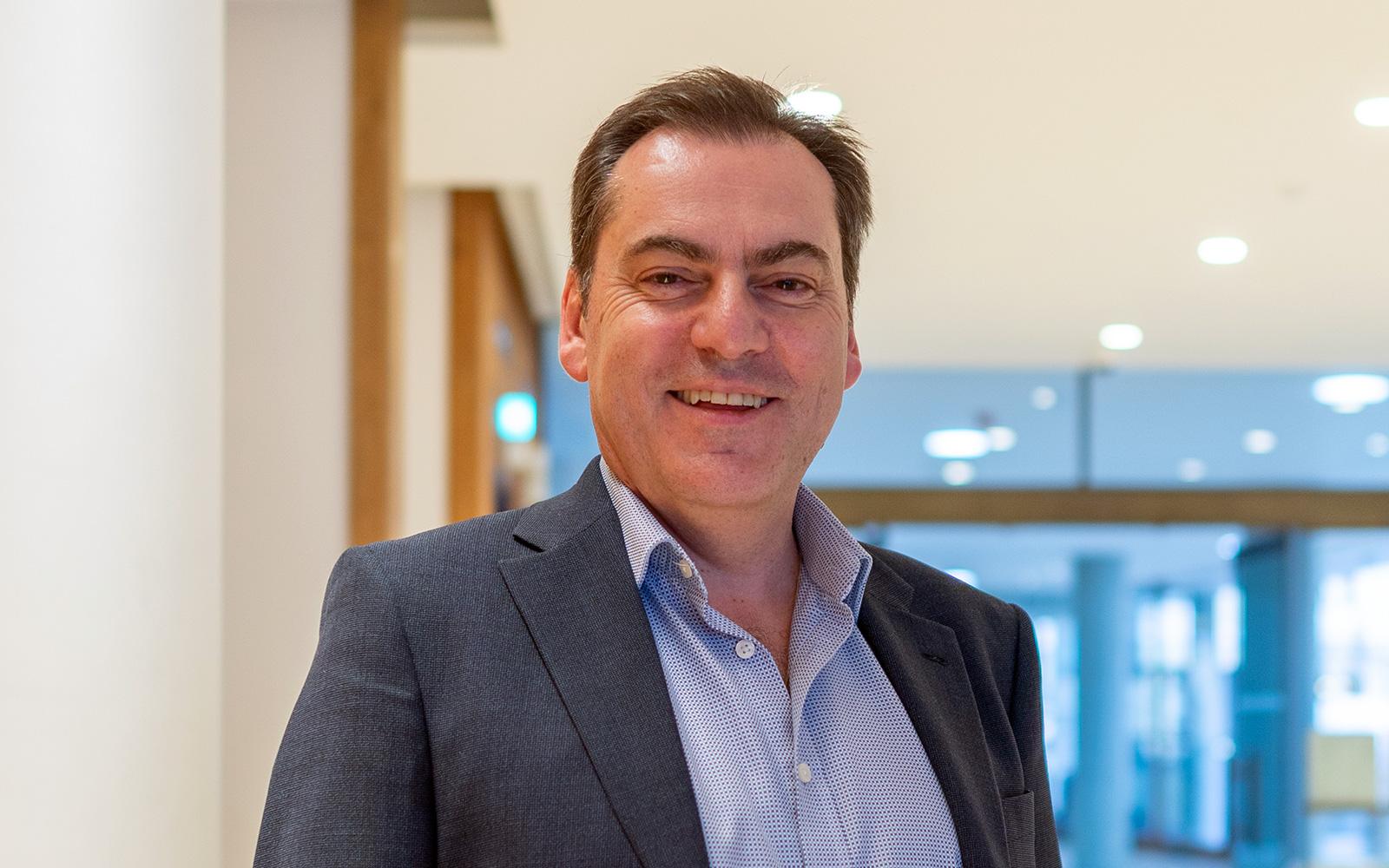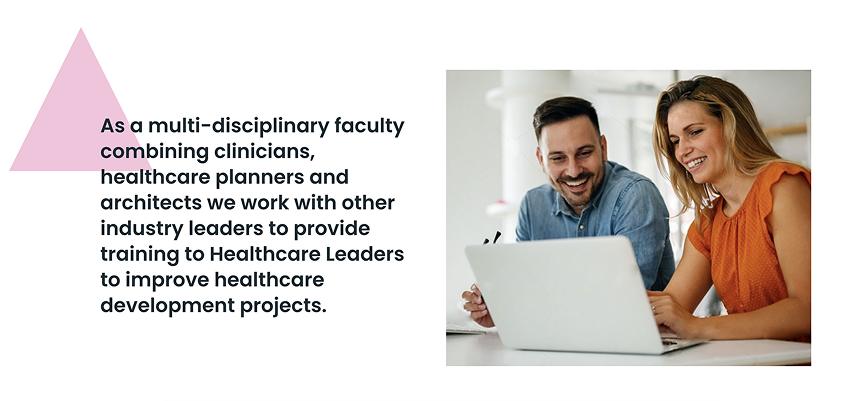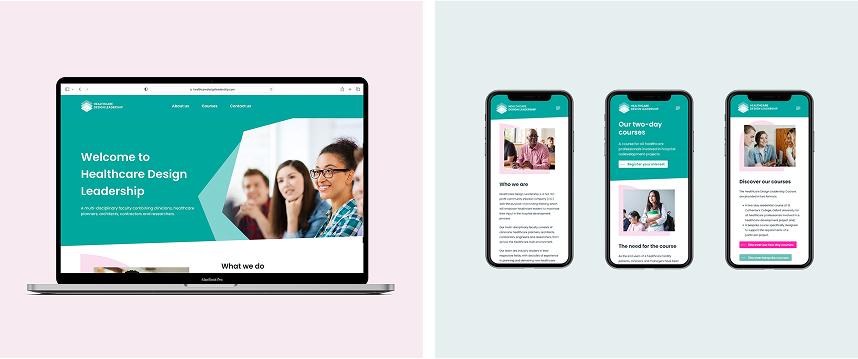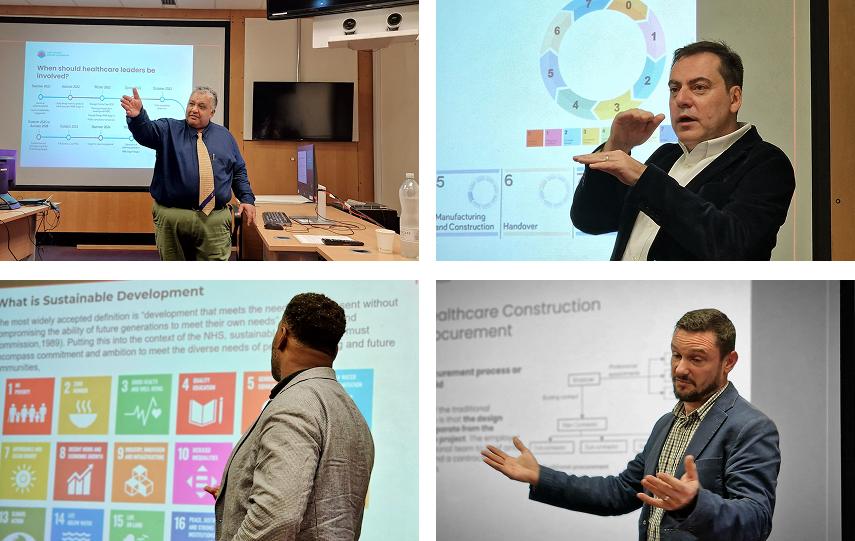Designing and building any new healthcare facility is a complex and demanding process that demands considered input from its potential users. Healthcare Design Leadership (HDL) is designed to give healthcare leaders within the NHS the skills, knowledge, and tools they need to maximise the value of that participation. Rob Etchell, along with Kate Bradley, Dan Gibson, and Ashok Handa, was one of the originators of HDL. He leads the healthcare business at Llewellyn Davies alongside Stephen Featherstone. In this context, Rob explains the genesis of HDL and how it works.

Rob Etchell, Director at Llewelyn Davies and Faculty Member of Healthcare Design Leadership providing training to healthcare leaders at the residential course at St Catherine’s College Oxford
How it all began
The idea for HDL emerged over a lunch in Jersey with Ashok Handa, Professor of Vascular Surgery at Oxford University, and Danny Gibson and Kate Bradley from MJ Medical, the healthcare planning and design consultancy.
We were discussing how to deliver the social value required when working on government procurement projects. Meeting that demand is relatively easy for contractors who can commit to employing locally. For architectural practices and healthcare planners, it’s not so easy.
At the same time we all recognised our frustration with the ability to input into healthcare projects by NHS clinicians. That contribution is essential but, too often, its value was limited by a lack of end user experience in the process of delivering large, complex schemes since the days of mass hospital builds during the PFI era.
That was the lightbulb moment. If we offered free training to clinicians and other stakeholders, we could kill two birds with one stone – improve the delivery of healthcare projects and use our key skills to deliver genuine social value.

The challenge of engaging stakeholders
When developing any healthcare facility, it is crucial to involve its eventual users. We have multiple meetings, mainly with clinicians, to discuss every aspect of the build. A strategic team of clinicians sign off on the proposed relationships between departments, other clinical groups then discuss the way individual departments work, and other users have their input in terms of equipment location and required room environmental conditions/performance.
Unfortunately, many ‘end users’ struggle with the very technical aspects of the design process and their contribution is of limited value. In the worst scenario, the result is a facility that truly fails to meet their needs and that can have huge implications, operationally and financially.
That’s no criticism of clinicians. I would struggle to understand an X-ray as they would a site plan. Tools such as virtual reality can make it easier for them but there is an urgent need to improve their grasp of the essentials, and hospital design process.
The HDL solution
The secret to a successful building is an informed client and HDL is designed to develop informed clients.
Training healthcare leaders empowers them to engage with the design process in an informed and active way. By maximising the value of their contribution, you end up with better, more efficient, and more cost-effective buildings.
HDL was set up in October 2022 as a not-for-profit community interest company (CIC) involving a group of experts from the fields of healthcare, academia, and the built environment.
Training is delivered by a multi-disciplinary faculty plus guest experts. It includes clinicians, healthcare planners, architects, engineers, contractors, IT experts, academics, and experienced NHS leaders. They have all worked together on various projects and recognise the benefits of upskilling the client body and clinicians. And they provide their expertise, experience, and time, completely free.

A new website was set up so that Healthcare Design Leaders can discover more about the course information and register their interest.
Delivering the training
We run two key programmes. One is a one or two-day residential course at St Catherine’s College Oxford, for around 25 participants who are only asked to contribute to paying for their accommodation and food. The tuition is provided for free.
Courses are targeted at the entire range of potential stakeholders, from clinicians, senior doctors and registrars through nurses and healthcare assistants to non-medical staff such as managers, purchasing teams, and hospital charities.

Ashok Handa (Professor of Vascular Surgery at the Oxford University), Rob Etchell, (Director, Llewelyn Davies) Victor Okpevba (Technical Director, WSP MJ) and Dan Gibson (Principal Consultant & Director, MJ Medical) providing training to healthcare leaders at the residential course at St Catherine’s College Oxford.
Training covers the whole project lifecycle. The courses provide an overview of the role of healthcare leaders, current trends in the transformation of clinical services, digital, technology, and equipment requirements, and the key considerations in developing clinical pathways. Plus project governance, the technicalities of design, net-zero carbon building requirements, the complexities of engineering and modern construction methods.
The approach is truly immersive. For each module, we demonstrate the issues and potential solutions, then present a problem for teams to tackle in a workshop. Finally, participants present their solutions to make sure that they have understood.
We also provide half to one-day bespoke courses for organisations engaged in specific projects.
Seeing the benefits
After the course, participants should understand all the stages of a project, from reviewing existing needs to moving into the new building. They should be able to describe the design and construction process and explain at what stage (or stages) their engagement can be critical. We have run bespoke courses for The Royal Marsden and Imperial College Healthcare NHS Trust. Both have used the skills gained to better understand their current live projects and give their clinicians and wider health stakeholders confidence in a working environment very different from their daily challenges.
One of the most valuable benefits to come out of the HDL initiative is the way that alumni use its LinkedIn portal. This works as a mentoring pool and allows them to talk to each other and to the faculty. Clinicians can meet their counterparts from other trusts, share common issues, and discuss how to go about resolving them.
Where do we go from here?
HDL has already exceeded our initial expectations. As of November 2024, more than 150 participants from over 10 NHS trusts have taken our courses.
As healthcare buildings become even more complex, and those with the experience of delivering them retire, our work will remain even more relevant and in demand, especially given the UK’s new hospital programme.
Our ambition is to help every NHS Trust become a highly informed client at all levels by training clinical and managerial NHS personnel on how to effectively engage in the design and development process.
There is also a suggestion of expanding the HDL training to other countries with different regulatory regimes. That’s something we might well consider if we have the time. After all, we all have day jobs as well!
Join the next Healthcare Design Leadership course
Healthcare Design Leadership are running another residential course at St Catherine’s College, Oxford University on the 18th and 19th June 2025. This 2-day course provides an immersive introduction to the whole project lifecycle of hospital development, providing opportunities for hands-on experience. The course fee is £450 for 2 days; breakfast and overnight accommodation is available at a discounted rate. Anyone in the NHS who may be involved in new healthcare developments can attend. Find out more information and book your tickets on the Healthcare Design Leadership website or email info@healthcaredesignleadership.com.

